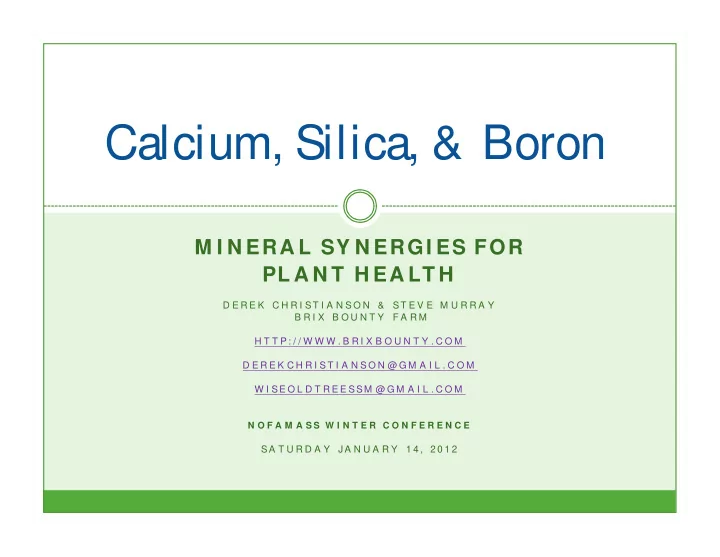

Calcium, Silica, & Boron M I N ERA L SY N ERGI ES FOR PL A N T H EA LT H D E R E K C H R I ST I A N SO N & ST E V E M U R R A Y B R I X B O U N T Y F A R M H T T P: / / W W W . B R I X B O U N T Y . C O M D E R E K C H R I ST I A N SO N @ G M A I L . C O M W I SE O L D T R E E SSM @ G M A I L . C O M N O F A M A S S W I N T E R C O N F E R E N C E SA T U R D A Y JA N U A R Y 1 4 , 2 0 1 2
Approaching Agriculture - Philosophy Brix Bounty Farm – Growing Food with Respect for the Earth & Future Generations Keys to Healthy Crops Addressing mineral deficiencies in our soils, increasing biological activities to ensure these minerals are available and biologically complexed, and ensuring adequate moisture and air in our soils we can achieve healthy crops. Yields and Farm Viability are Connected with Soil Health
Plant Functions and Benefits of Calcium Growth Proper cell division & elongation Structure Proper cell wall development Quality and Storage Life Disease Mitigation – Calcium Pectatein Cell Walls re: Fungi Assist Nutrient Uptake Secondary Messenger – “Guard” Stimulating Protein Channels
Plant Functions of Silica Protection from Stress Silica in Cell Walls Abiotic – Rigidity Protects against nutrient toxicity Biotic – Resist Fungal Stress with Stronger Cell Walls Promotes Biosynthesis of Defense Compounds: Secondary Plant Metabolites – (equisetum, etc.)
Plant Functions of Boron Cell Wall Structure Bonding of Polysaccharides (molecular staple) Cell Division (all new growth) Root Tips, New Leaves, & Bud Development, etc. Sugar Transport Increased rate of transport from mature leaves > new growth Transporter of Potassium to Guard Cells (Stomata) Water balance, transpiration > mass flow (nutrient uptake)
General Recommended Amounts (in Soil) Calcium Base Saturation Approach – Levels Determined by CEC Suffiency Levels of Available Nutrients (SLAN) – McKibben Low CEC soils Reams – Available Calcium 3000 pounds per acre Silica SilicicAcid – key to availability (weathering and/or bioactivation) New Testing Methods In Development Boron (anion) readily leaches with nitrogen 1-3 ppm Based on Crop, Timing, and Calcium Levels
Calcium (Availability) Misconception: If you have a high pH you always have plenty of Calcium available. (False) CEC – Quantity Competition with other Cations Moisture Levels – Need Water /Transpiration for Mass Flow Importance of Availability at Root Tip Needed Consistently Throughout the Season
Silica (Availability) Plant uptake – Silicic Acid (H 4 Si0 4 ) – Mass Flow Weathering in Soils > Increase Availability Weather Soils (but Not Too Much) Bioactivation Needs Partially Dictated by Plant Form Needed Throughout the Season (to counteract stress)
Boron Highly Leachable as Borate (H 4 BO 4 ) Lower pH = Higher Availability Dependent on Organic Matter (ability to hold ions) Low Moisture Limits B Availability (mass flow) High Calcium Levels Need Higher Boron Levels Depending on Crop – “Differing Needs” Variations in B Mobility Fruiting Crops
Necessity of All 3 - Synergy We Need to Honor the Complexity of Biological Systems. NPK and Traditional Bottom Line Accounting Shortchange our Capacities as Farmers and Providers. Calcium, Silica, & Boron is Just One Example of Mineral Synergies in our Healthy Crop Production Molybdenum & Nitrogen – Nitrate ReductaseEnzyme
Testing (and Availability) Gather Information to Assess Needs Different Tests Yield Different Results Avoid “Shooting Blind” Provide Another Tool for Learning the Land
Calcium Applications Mineral Sources High Calcium Limestone Dolomitic Limestone Gypsum Rock Phosphates Bone Char or Bone Meal Micronized Sources Chelated Sources Humic Substances with Dry Applications
Silica Applications “Biological Activity” Equisetum Potassium Silicates (from sand/OMRI approved) Clays, Diatoms, Etc. BD 501
Boron Applications Need to Show “Nutrient Deficiency” for Applications Split Applications is Recommended Careful, Careful, Careful Dry – Borax (9%B) or Solubor DF (18% B) Liquid – Solubor (21% B) – Important to “stabilize” w/carbon Foliar - Solubor (21% B)
Timing of Mineral Applications Calcium , Silica, & Boron All Needed Throughout the Growing Season Avoiding Nutrient Tie Ups with Calcium Applications Best to Allow Soil Biology to Complex Nutrients Natural Cycles to the Seasons
Financial Considerations Investing in our Soils and Plant Vitality “Savings” – Improved Yield and Quality Calcium “Costs” – possible to build up $60-$200/acre for 1 ton/acre lime – for multiple seasons $20-$100/acre for 100-500#/acre gypsum (23% Ca, 17% S) Bone Char (33% Ca), Rock Phosphate (~20% Ca) Micronized Sources - $8-10/acre Silica “Costs” – possible to build up Boron “Costs” – often “needed” annually $8 -$20/acre for 5-15#/acre Solubor (21%B)
Tying it Together with Ca, Si, & B Healthy Plants Creating Disease Resistance with Strong Cell Walls and Proper Nutrient Cycling… Hugh Lovel’sArticle: “The Biochemical Sequence of Plant Nutrition” Trial, Observe, & Learn, Trial, Observe, & Learn Trial, Observe, & Learn
Thank You Bibliography for This Presentation Available at www.brixbounty.com For more information on this presentation contact: Derek Christianson Brix Bounty Farm 858 Tucker Road Dartmouth, MA 02747 508-992-1868 derekchristianson@gmail.com
Recommend
More recommend